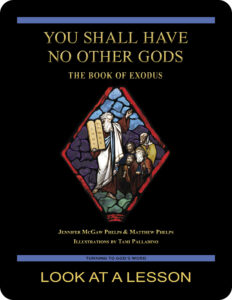law & commandment
 In the Gospel According to Matthew 22:36 (NABRE), a lawyer asks Jesus an extremely important question: “Teacher, which commandment in the law is the greatest?” Beyond giving us Jesus’ answer and insight into God’s view of the meaning and purpose of Old Testament events, this question also gives us an interesting insight into Jewish law. This question is based on two concepts—law and commandment. The Greek word translated here as law, νόμος (nomos), matches well with our modern conception of law and also with the Jewish view of the law at that time. The word for commandment, ἐντολή (entole, likewise matches well to our sense of what an order or commandment is.
In the Gospel According to Matthew 22:36 (NABRE), a lawyer asks Jesus an extremely important question: “Teacher, which commandment in the law is the greatest?” Beyond giving us Jesus’ answer and insight into God’s view of the meaning and purpose of Old Testament events, this question also gives us an interesting insight into Jewish law. This question is based on two concepts—law and commandment. The Greek word translated here as law, νόμος (nomos), matches well with our modern conception of law and also with the Jewish view of the law at that time. The word for commandment, ἐντολή (entole, likewise matches well to our sense of what an order or commandment is.
Still, from a modern point of view, there’s an interesting contrast between these two ideas. We commonly tend to think of laws as prohibitions or limits on what we can do, and they typically function as such. Commandments, by contrast, tell us what we’re expected to do.
Jesus’ view of the Old Testament law here emphasizes not what people shouldn’t do as found (for example) in the 10 Commandments, but rather the positive command about what we should do. Christianity at its heart is not a negative religion defined but what its followers don’t do, but a positive religion defined by what we do.
you also may like our study of the book of Exodus
 You Shall Have No Other Gods: The Book of Exodus, a 28-lesson Catholic Bible study with an imprimatur, provides an in-depth look at how significant events in biblical history that occurred thousands of years ago to descendants of Jacob remain relevant and even critical for present-day Christians to understand. The deliverance of the Hebrews from slavery in Egypt and the giving of Ten Commandments are examined along with the development of Moses’ relationship to God. Click on the book’s cover to view a sample lesson.
You Shall Have No Other Gods: The Book of Exodus, a 28-lesson Catholic Bible study with an imprimatur, provides an in-depth look at how significant events in biblical history that occurred thousands of years ago to descendants of Jacob remain relevant and even critical for present-day Christians to understand. The deliverance of the Hebrews from slavery in Egypt and the giving of Ten Commandments are examined along with the development of Moses’ relationship to God. Click on the book’s cover to view a sample lesson.
 Click on the picture of the statue of Moses with horns (above) to learn more about Lost in Translation. A new entry is archived each Monday. Contact us to receive Lost in Translation by email every week. You may use any of the contact links on our website to ask Matthew a question.
Click on the picture of the statue of Moses with horns (above) to learn more about Lost in Translation. A new entry is archived each Monday. Contact us to receive Lost in Translation by email every week. You may use any of the contact links on our website to ask Matthew a question.
